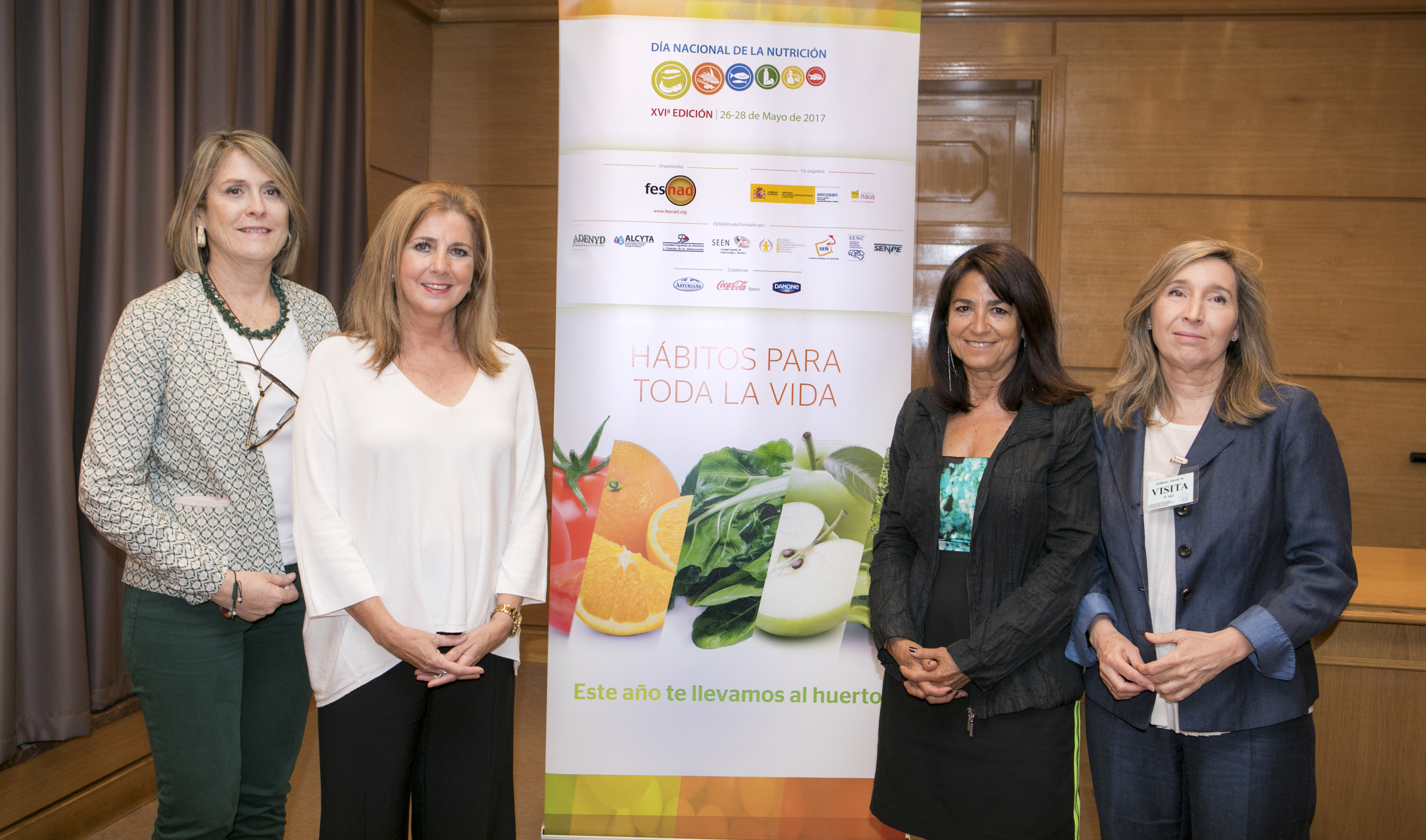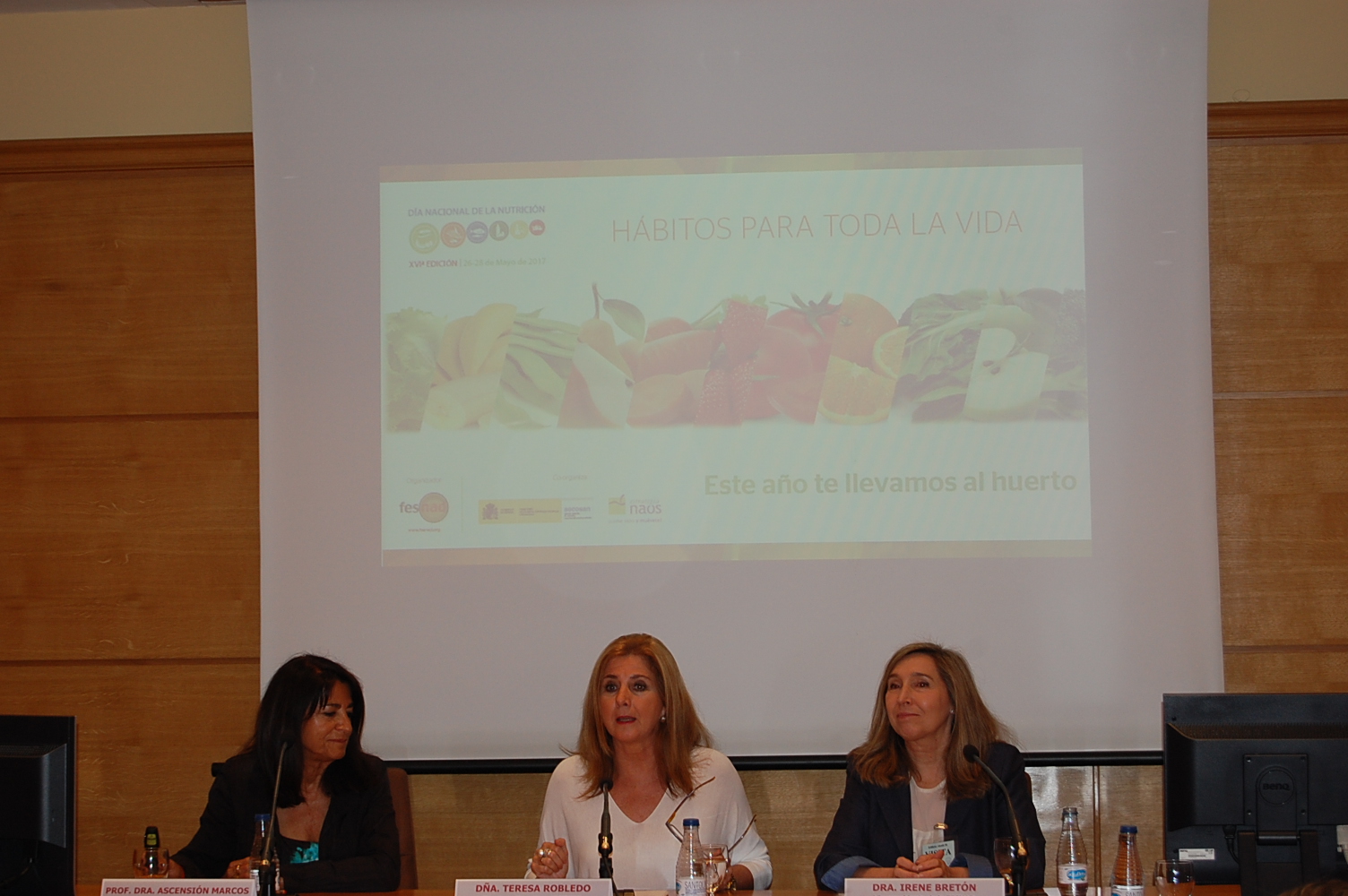16th Edition of NATIONAL NUTRITION DAY
Date: 26 mayo 2017
Section: Nutrición
“Este año te llevamos al huerto”

National Nutrition Day “Let's visit the vegetable garden”
- The objective of the campaign “Lifelong habits: This year, let's visit the vegetable garden” is to make people aware of the importance of fruit and vegetables in our diet, not only because of their nutritional wealth but also because of their organoleptic properties.
- The FESNAD and the AECOSAN remind you that a healthy diet accompanied by physical exercise is essential for our health.
Madrid, 26 May 2017. Fruit and vegetables are essential for our diet, providing water, fibre, vitamins and mineral salts. This is the reason that the 16th Edition of National Nutrition Day, held every year on 28 May, focusses on the importance of a good diet in combination with healthy lifestyles. In line with the topic “This year, let's visit the vegetable garden”, today the FESNAD (Spanish Federation of Nutrition, Food and Dietetics Societies) and the AECOSAN (Spanish Agency for Consumer Affairs, Food Safety and Nutrition), have presented the activities which will take place during this year's campaign to make the general public more aware of the importance of a healthy lifestyle.
Participants at the campaign presentation included Mrs Teresa Robledo, Executive Director of the Spanish Agency for Consumer Affairs, Food Safety and Nutrition; Dr Ascensión Marcos, President of the FESNAD; and Dr Irene Bretón, Vice-president of the FESNAD, who highlighted that the recommended daily intake of fruit and vegetables is five portions. This is essential for the maintenance of a good diet, not only because of the nutritional wealth but also because they provide a wide range of foods and the organoleptic and structural properties offer a range of presentations to make them more appetising.
During the presentation, listeners were reminded how a lack of these foods in our diet could result in large nutrient deficiencies, including vitamins, fibre or mineral salts. Moreover, fruit and vegetables are an undisputed source of water which, as underlined by the representatives from FESNAD, is essential for keeping our bodies correctly hydrated.
Dr Ascensión Marcos, president of FESNAD, during her speech, highlighted the fact that “Our country, part of the Mediterranean culture, offers an endless variety of fruit and vegetables. Moreover, almost all the Autonomous Communities offer typical products from the vegetable garden, thus increasing the variety available”. The methods of preparation were also an area of interest during the presentation, according to Dr Marcos, “Culinary techniques used in cooking processes also play a major role in the preservation of nutrients. Steaming is a recommended method but it is best to experiment and discover that these food products do not need to be boring or monotonous in any way”.
Both the FESNAD and the AECOSAN state that “eating 2-3 portions of fruit and another 2-3 portions of vegetables per day, incorporated into breakfast, lunch, tea, as a side dish and/or as dessert at main meals (lunch and supper), helps our body to prevent many diseases including cardiovascular disease, cancer, digestive disorders and some neurodegenerative diseases thanks to the high content of vitamins, fibre, antioxidants and minerals”.
In turn, MrsTeresa Robledo, Executive Director of the Spanish Agency for Consumer Affairs, Food Safety and Nutrition described the work carried out by the AECOSAN through the NAOS Strategy and recalled that “the creation of healthy habits such as eating 5 portions of fruit or vegetables per day from infancy is essential for preventing childhood obesity and the development non-communicable diseases at the different stages of life”. In addition, she added that “according to data from the National Dietary Survey on the Child and Adolescent Population, ENALIA of the AECOSAN, only 30 % of children aged between 6 months and 17 years eat fresh fruit or drink fresh fruit juices more than once a day, and only 3 % eat vegetables more than once a day”, and that “the family is the perfect environment, together with the school, to promote and encourage the consumption of fruit and vegetables among children”.
Lifelong habits
Dr Irene Bretón, Vice-president of the FESNAD, indicated that “with this year's slogan we want to make the population aware of the importance of fruit and vegetables, both in children's development and as adults. However, we should not neglect the diet as a whole, the use of suitable culinary techniques, hydration and an active lifestyle”.
Eight guidelines have been recommended for the promotion of the consumption of fruit and vegetables:
|
“This Year, Let's Visit the Vegetable Garden”
To celebrate National Nutrition Day each Community will hold different activities to promote healthy lifestyles among the population. In Madrid, as for the previous edition, in collaboration with Madrid Salud, there will be a 3.8 Km healthy stroll departing from Paseo Yeserías 15, on Sunday 28 May at 10:30 h. The objective of the stroll is to promote physical activity and to make people more aware of the importance of a healthy diet and adequate hydration, accompanied by daily physical activity.
In addition, workshops will be organised for the youngest members of the population throughout the morning. Here they will have the opportunity to learn about the campaign first hand and about the importance of eating fruit and vegetables from infancy.
On 26 May, from 10.00 hours, there will be a number of activities taking place at the Parque del Retiro. A Healthy ethnobotanical stroll will leave from the Cabaña del Retiro, led by environmental educators who will describe the plants and the uses of different vegetables. There will be a talk on the healthy consumption of fruit and vegetables led by Food Technologists and Nutritionists at the Retiro Park nurseries.
Younger children will also have the opportunity to learn about eating fruit and vegetables, thanks to an educational talk and personalised visit to the vegetable gardens. Here, they will lean about the care and identification of the products grown in the vegetable garden.
Different activities are also being organised in the rest of Spain to celebrate National Nutrition Day. In Orihuela in Alicante, there will be a series of activities taking place in the Higher Polytechnic School (EPSO) at Miguel Hernández University in Elche, directed at Secondary and Baccalaureate students (23 and 26 May) and for the general public (Saturday 27 May). There will be conferences and educational workshops given by Food Science and Technology Graduates, the Badali Group (UMH) and members of the management of the EPSO. The Association of Chefs and Pastry Chefs from Alicante will also take part, offering samples of dishes prepared using fruit and vegetables, with special emphasis on new foods such as chia and quinoa.
About the FESNAD
The Spanish Federation of Nutrition, Food and Dietetics Societies was created with the aim of promoting research, training and education and clinical and community practice. It also acts as a spokesperson in the areas of Food, Nutrition and Dietetics before different national and international authorities. The FESNAD is formed of the following Nutrition societies: ADENYD, ALCYTA, SEDCA, SEEN, SEGHNP, SEÑ, SENC and SENPE.
For further information: www.fesnad.org
About the AECOSAN
The Spanish Agency for Consumer Affairs, Food Safety and Nutrition was created from the merge between the Spanish Agency for Food Safety and Nutrition and the National Consumers Institute (Royal Decree 19/2014).
The adaptation of both autonomous organisations allows consumer and user protection to be addressed from a single administrative body under a sole board of management, thereby ensuring unified criteria, hindering the appearance of malfunction in the compliance of tasks and gaining in efficiency and effectiveness in the management of the State General Administration.
The fundamental objectives of the AECOSAN are:
- Exercising the promotion and development of consumer and user rights, both with regard to the safety of products and their economic interests.
- Promoting food safety, offering guarantees and objective information to consumers and food business operators from the Spanish agri-food sector.
- Planning, coordination and development of strategies and actions which foster the information, education and promotion of health in the area of nutrition, and in particular, in the prevention of obesity.
For further information on the AECOSAN and on the NAOS STRATEGY
